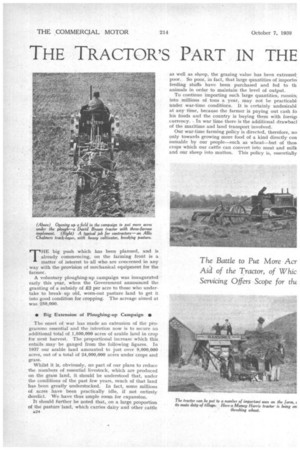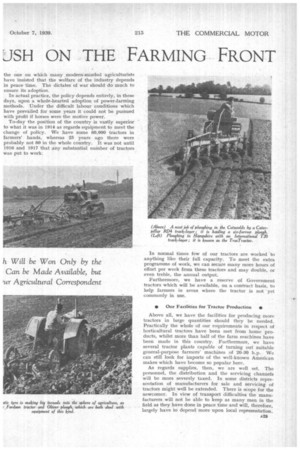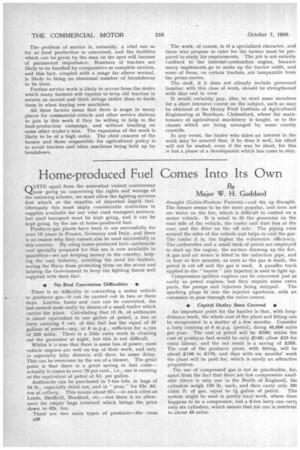THE TRACTOR'S PART IN THE JSE1 ON THE FARMING FRONT
Page 26

Page 27

Page 28

If you've noticed an error in this article please click here to report it so we can fix it.
THE big push which has been planned, and is already commencing, on the farming front is a matter of interest to all who are concerned in any _ way with the provision of mechanical equipment for the farmer.
A voluntary ploughing-up campaign was inaugurated early this year, when the Government announced the granting of a subsidy of £2 per acre to those who undertake to break up old, worn-out pasture land to get it into good condition for cropping. The acreage aimed at was 250,000.
• Big Extension of Ploughing-up Campaign The onset of war has made an extension of the programme essential and the intention now is to secure an additional total of 1,500,000 acres of arable land in crop for next harvest. The proportional increase which this entails may be gauged from the following figures. In 1937 our arable land amounted to just over 9,000,000 acres, out of a total of 24,000,000 acres under crops and grass.
Whilst it is, obviously, no part of our plans to reduce the numbers of essential livestock, which are produced on the grass land, it should be understood that, under the conditions of the past few years, much of that land has been greatly understocked. In fact, some millions of acres have been practically idle, if not entirely derelict. We have thus ample room for expansion.
It should further be noted that, on a large proportion of the pasture land, which carries dairy and other cattle A24 as well as sheep, the grazing value has been extreme]; poor. So poor, in fact, that large quantities of importe4 feeding stuffs have been purchased and fed to th animals in order to maintain the level of output.
To continue importing such large quantities, runnini into millions of tons a year, may not be practicabl under war-time conditions. It is certainly undesirabl at any time, because the farmer is paying out cash fo his foods and the country is buying them with foreigi currency. • In war time there is the additional drawbacl of the maritime and land transport involved.
Our war-time farming policy is directed, therefore, no only towards growing more food of a kind directly con sumable by our people--such as wheat—but of thos. crops which our cattle can convert into meat and milk and our sheep into mutton. This policy is, essentially the one on which many modern-minded agriculturists have insisted that the welfare of the industry depends in peace time. The dictates of war should do much to ensure its adoption.
In actual practice, the policy depends entirely, in these days, upon a whole-hearted adoption of power-farming methods. Under the difficult labour conditions which have prevailed for some years it could not be pursued with profit if horses were the motive power.
To-day the position of the country is vastly superior to what it was in 1914 as regards equipment to meet the change of policy. We have some 60,000 tractors in farmers' hands, whereas 25 years ago there were probably not 60 in the whole country. It was not until 1916, and 1917 that any substantial number of tractors was put to work. In normal times few of our tractors are worked to anything like their full capacity. To meet the extra programme of work, we can secure many more hours of effort per week from these tractors and may double, or even treble, the annual output.
Furthermore, we have a reserve of Government tractors which will be available, on a contract basis, to help farmers in areas where the tractor is not yet commonly in use.
• Our Facilities for Tractor Production • Above all, we have the facilities for producing more tractors in large quantities should they be needed. Practically the whole of our requirements in respect of horticultural tractors have been met from home products, whilst more than half of the farm machines have been made in this country. Furthermore, we have several tractor plants capable of turning out suitable general-purpose farmers' machines of 20-30 h.p. We can still look for imports of the well-known American makes which have become so popular here.
As regards supplies, then, we are well set. The personnel, the distribution and the servicing channels will be more severely taxed. In some districts representation of manufacturers for sale and servicing of tractors might well be extended. There is scope for the newcomer. In view of transport difficulties the manufacturers will not be able to keep as many men in the field as they have done in peace time and will, therefore, largely have to depend more upon local representation, The problem of service is, naturally, a vital one so far as food production is concerned, and the facilities which can be given by the man on the spot will become of paramount importance. Numbers of tractors are likely to be handled by comparative or complete novices, and this fact, coupled with a usage far above normal, is likely to bring an abnormal number of breakdowns in its train.
Further service work is likely to accrue from the desire which many farmers will express to keep old tractors in service as second and third strings rather than to trade them in when buying new machines.
All these factors mean that there is scope in many places for commercial-vehicle and other service stations to join in this work if they be willing to help in the food-production campaign, and without treading on some other trader's toes. The expansion of the work is likely to be of a high order. The chief concern of the farmer and those responsible for agricultural policy is to avoid tractors and other machines being held up by breakdown. The work, of course, is of a specialized character, and those who propose to cater for the farmer must be prepared to study his requirements. The job is not entirely confined to the internal-combustion engine, because many implements.go to make up the tractor outfit, and some of them, on certain tractors, are inseparable from the prime-mover.
The staff, if it does not already include personnel familiar with this class of work, should be strengthened with that end in view.
It would certainly pay, also, to send some members for a short intensive course on the subject, such as may be obtained at the Henry Ford Institute of Agricultural Engineering at Boreham, Chelmsford, where the maintenance of agricultural machinery is taught, or to the classes which are being arranged by some county councils.
In any event, the trader who takes an interest in the work may be assured that, if he does it well, his effort will not be wasted, even if the war be short, for this is but a phase of a development which has come to stay.




















































